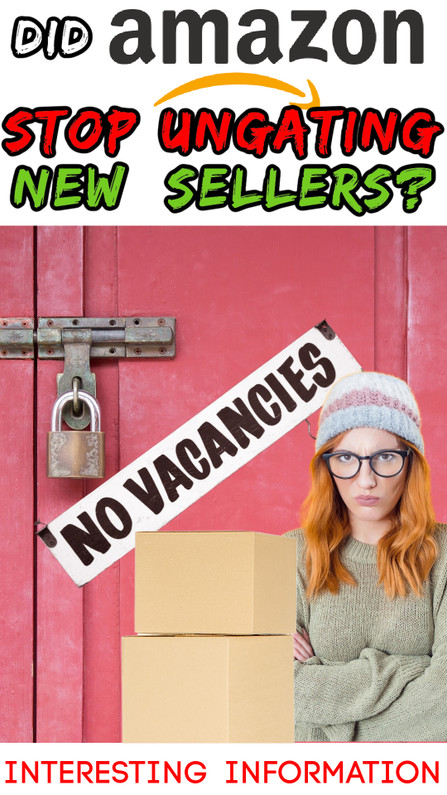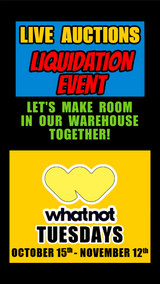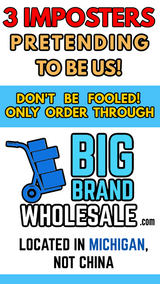Is Amazon No Longer Accepting New Sellers?
We have noticed that something interesting, perhaps strange, is going on with Amazon. Here's what we know:
The other day my buddy who owns a wholesale company in New Jersey asked me if our wholesale company is still getting nailed with Invoice Verifications from Amazon (which is how Amazon Ungates new sellers. You can learn more about how the Ungating Process works BEHIND THE SCENES here.) When my friend asked this question, it dawned on me that the amount of invoice validations we are being sent by Amazon has sharply decreased. When I replied to my friend, stating that we have noticed a massive drop in verifications, his reply was "Same here. It is only a couple a week now". This led to a conversation between the two of us about WHY. Here's what we concluded:
Let's rewind for a quick second: In all of 2020 and January through November of 2021, both of our wholesale companies were getting utterly nailed with emails from Amazon, asking us to confirm invoices. If we confirmed the invoice was real (as well as other details on the invoice being accurate), the Amazon seller who applied for Ungating would usually become Ungated. Back in 2018 and early 2019, we were getting a small handful of these requests from Amazon, but by 2020 it was becoming a part-time job for both of our companies. Earlier this year I looked at my emails, from Amazon, regarding invoice verification and on peak weeks we were getting 80, YES, 80, PER WEEK!!! But fast forward to December 2021 and we are averaging 4 per week. ONLY 4 PER WEEK!!! That is basically a 95% decrease in sellers that Amazon is looking to Ungate. But why? Well, here's our guesses (these are just guesses, we don't have any solid evidence, but we feel these guesses make the most sense):
1. Looking back at the evolution of Amazon, this site went from only selling books, to being a marketplace. When it became a marketplace the same people selling on eBay jumped at the opportunity to sell their inventory on Amazon. The result was private sellers listing their Calvin Klein brand sweaters, Levis jeans, Nike shoes, Sharpie brand markers and everything in between.
By 2020 the actual brands (Calvin Klein, Nike, Levis, Sharpie, etc) realized Amazon was a viable site to sell on and began creating selling their own merchandise on the platform. By 2022 you are able to find an Amazon store for damn near any popular brand.
It is our suspicion that when a brand commits to having their own Amazon store, Amazon likely stops approving new private sellers of that brand. Or, if Amazon is allowing more sellers, they seem to be greatly reducing the quantity they are Ungating.
2. It is also possible that Amazon feels their site is becoming overpopulated with specific brands or types of products. In my opinion, Amazon may feel that 500 listings of the identical item is too many. Afterall, whoever has the famous "Buy Box" is most likely to get the sale, so the other 499 listings rarely get viewed.
3. The last possibility we brainstormed is that perhaps Amazons long-term goal is to have Levis company sell Levis brand, while Sharpie company sells Sharpie products, meanwhile Amazon focuses on their "Amazon Basics" product line for people who don't need name brand markers, but instead would rather buy the cheapest markers. We have all watched as Amazon Basics has begun popping up all over, no matter what you search Amazon for. It appears that Amazon is focusing on driving traffic to their own branded competitor products. Don't believe me? Search Amazon for Sharpie Markers, and look at the recommended products... boom, Amazon Basics.
With that in mind, where does that leave the private seller whose inventory consists of designer brands? The answer is, "I'm not sure". Is the long term goal to eventually weed out private sellers? Quite possibly. We have personally witnessed YouTube using private content creators to build their platform into being the juggernaut it is today, and once YouTube launched their own network, they started scrubbing channels they simply disliked. YouTube went from being a video site where anyone could post anything from cooking tutorials to product videos to commentary, video gaming, vlogs and more, to a platform that markets and features specific content creators and programs.
IN CLOSING
If you are currently looking to start an Amazon account and sell designer brand products, I would encourage you to have a backup selling plan because becoming Ungated might be an uphill battle. Again, I have no proof of this, other than our company and our friends wholesale company both witnessing a sharp decrease in invoice validations, which means Amazon is Ungating 95+% fewer sellers.
Recent Posts
-
WhatNot LIVE AUCTIONS LIQUIDATION EVENT! October 15th - Nov 12th!
We are doing a MASSIVE liquidation auction event on WhatNot! Every TUESDAY from October 15th thr …2nd Oct 2024 -
MASSIVE NEWS! 4 HUGE UPDATES Coming to Big Brand Wholesale.com!
We have TONS of exciting news! Check out our Facebook video from July 12th 2024 (below) then keep r …22nd Jul 2024 -
3 COMPANIES PRETENDING TO BE BigBrandWholesale.com! DO NOT ORDER THROUGH IMPOSTERS!
IMPOSTERS! BE CAREFUL!! DON’T BE FOOLED! We now have at least 3 different people PRETENDING to …23rd Dec 2023




